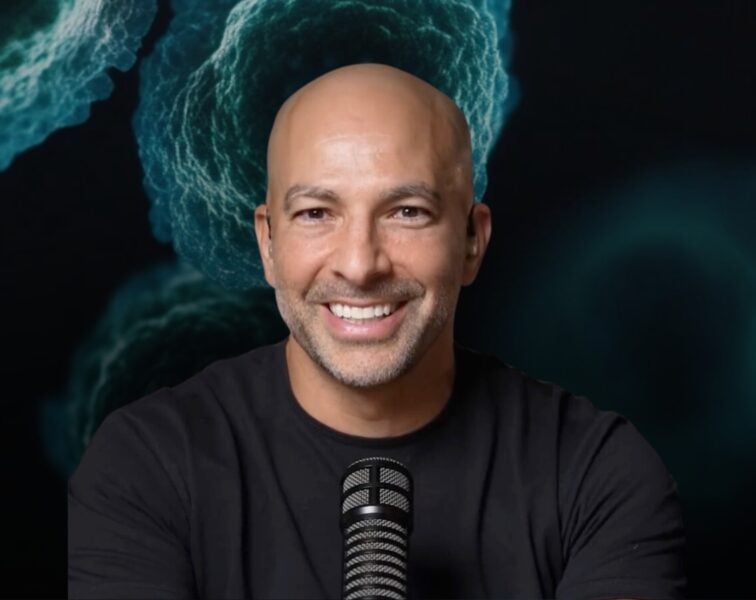In this episode, Jason Fung, nephrologist and best-selling author, shares his experiences utilizing an individualized approach to fasting to successfully treat thousands of overweight, metabolically ill, and diabetic patients, and why being a doctor who specializes in kidney disease gives him a unique insight into early indications of metabolic disease. We also have a great discussion on insulin resistance where Jason makes the case that we should actually think of hyperinsulinemia as the underlying problem. We also discuss the difference between time-restricted feeding, intermittent fasting, and dietary restriction (e.g., low-carb) and how they can be used to attack the root cause of T2D, metabolic syndrome, and obesity. We also have a fascinating discussion about the limitations of evidence-based medicine which leads to a conversation where we compare and contrast the scientific disciplines of medicine and biology to theoretical physics.
Subscribe on: APPLE PODCASTS | RSS | GOOGLE | OVERCAST | STITCHER
We discuss:
- Comparing scientific disciplines: Medicine and biology versus physics [7:25];
- The limitations of evidence-based medicine [12:30];
- Early signs of metabolic disease: How specializing kidney disease gives Jason a unique insight into early indications of illness [20:50]
- Insulin resistance, hyperinsulinemia, and the overflow paradigm [29:30];
- Why the common treatments for type 2 diabetes seem to make things worse [42:30];
- How hyperinsulinemia (not insulin resistance) drives metabolic syndrome [53:15];
- Insulin and weight gain, and using fasting to empty the cells of glucose [59:30];
- The two step process of developing type 2 diabetes and how they are both manifestations of hyperinsulinemia [1:03:15];
- NAFLD and hyperinsulinemia: A vicious cycle [1:08:30];
- Are the features and symptoms of diabetes actually protective? [1:12:15];
- Is obesity causing insulin resistance or is it the other way around? [1:17:30];
- What role does inflammation play in obesity? [1:21:45];
- CVD and cancer: Diseases of too much growth? [1:27:30];
- How to reduce proliferation with rapamycin, nutrition, exercise, fasting, and manipulating hormones [1:32:45];
- Getting patients to fast: How Jason and Peter utilize fasting in their practice, and how their approach differs [1:40:15];
- Comparing bariatric surgery to fasting as a treatment for type 2 diabetes [1:48:00];
- Why people think that fasting is bad for you [1:55:15];
- Time-restricted feeding and intermittent fasting: Defining terms, and how Jason applies them in his practice [1:58:30];
- A fasting case study: A diabetic patient with a non-healing foot ulcer [2:04:00];
- Keys to a successful fast [2:12:45];
- Muscle loss during fasting, and why Jason isn’t worried [2:24:45];
- Will fasting help a healthy person live longer? [2:31:30];
- Does fasting cause gallstones? [2:38:45]; and
- More.
Get Peter’s expertise in your inbox 100% free.
Sign up to receive An Introductory Guide to Longevity by Peter Attia, weekly longevity-focused articles, and new podcast announcements.
Comparing scientific disciplines: Medicine and biology versus physics [7:25]
What makes Jason’s perspective unique
- Peter says what distinguishes Jason from others who like to speak about the benefits (and risks) of fasting is that Jason is on the front lines treating patients
- Jason agrees, and adds that he’s only interested in what works ⇒ “You can talk all you want about this and that, but if it doesn’t change management, then it doesn’t interest me particularly.”
Physics
- Jason loves the approach to scientific progress in the realm of physics
- He really looks up to Richard Feynman (as does Peter), Einstein, and Niels Bohr
- “The way they do science is so much better than we do in medicine.”
- In physics, if the theory doesn’t agree with experimental evidence, you have to throw out the theory
- In medicine, bad theories tend to go round and round and round because they make sense, but nobody’s actually put them to the test
- In the case of insulin resistance… “the way we think about insulin resistance is sort of totally wrong and that’s why we have the sort of mess that we have”

Biology vs. physics
- Peter: “I’m generally suspect of people who have very, very strong points of view on things in biology or medicine who no longer interact with patients. Doesn’t mean that they’re wrong, but I’m generally suspect because of that.”
- Biology is harder than physics…. it’s just a lot messier
- Peter: “Every time I think I’ve really got it figured out, I’ll always meet a patient who proves me wrong.”
What Jason appreciates most about physics
- Many great theories (e.g., Newton)
- But then inevitably there are anomalies ⇒ “Anomalies are what drives sort of science forward because you have to come up with a better theory that explains the anomalies”
- Then you come up with a better theory which may have wild predictions but it could supplant the existing theory (i.e. Niels Bohr’s quantum theory supplanted Einstein)
- This doesn’t happen in medicine, says Jason… instead we have a super laborious process of evidence-based medicine
The limitations of evidence-based medicine [12:30]
Jason explains his frustrations…
- In medicine, we have a super laborious process
- We need evidence in order to move things forward
- Whereas physics moves at “light speed” because it doesn’t demand the sort of evidence base
- Evidence-based medicine is not a search for truth… it’s a search for consensus
- This approach makes things move glacially
⇒ For example, fasting…
{end of show notes preview…}
Would you like access to extensive show notes and references for this podcast (and more)?
Check out this post to see an example of what the substantial show notes look like. Become a member today to get access.

Jason Fung, M.D.
Dr. Jason Fung is a Canadian nephrologist who one of the most significant clinical practices that utilizes fasting for treatment of metabolic disease in Toronto, Canada.
He has written multiple best-selling books and he co-founded the Intensive Dietary Management program.
Dr. Fung graduated from the University of Toronto and completed his residency at the University of California, Los Angeles.



